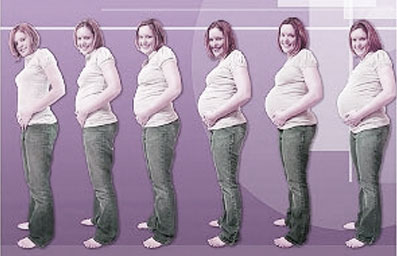Pregnancy Week 1
 This is the beginning of your pregnancy journey and week 1. It is one of the most fascinating and magical journeys you may ever go through in your life. Chances are you are on this page to find out when and if you have pregnancy symptoms or signs of pregnancy.
This is the beginning of your pregnancy journey and week 1. It is one of the most fascinating and magical journeys you may ever go through in your life. Chances are you are on this page to find out when and if you have pregnancy symptoms or signs of pregnancy.
Your forty weeks of (or 280 days, if you deliver full-term) of pregnancy officially begin on the first day of your last known menstrual period. Even though you haven’t ovulated or conceived yet, your doctor or midwife considers this to be the first week of your pregnancy. This means that the average gestation for a baby is really only about 38 weeks full-term.
At the beginning of this first week you will have started the first day of your monthly cycle, meaning the first week of pregnancy is when you are on your period. Your uterus is being cleansed in preparation for another cycle. Ovulation usually occurs about two weeks after the first day of this “cleaning stage”, but it varies greatly depending on how regular your cycles are. Your body is starting to prepare itself for the possibility of an upcoming ovulation and fertilization.
Since you may be thinking about conception at this point, planning ahead for this experience can improve your chances of conceiving and having a healthy pregnancy. You should start by pretending that you are already pregnant, since just about everything you eat, drink, or take into your body during your pregnancy will be passed on to your developing baby. If you smoke, now is a good time to kick the habit and give up cigarettes (if you haven’t already done so), because smoking while you’re pregnant will put your baby in danger, in many ways. Other people in your home who smoke should also cut back or quite. They shouldn’t smoke around you when you’re pregnant.
Now is the time to begin healthy eating habits, including cutting down on caffeine. You need to eat a healthy, balanced diet to keep you healthy and prepare your body for pregnancy. If you are hoping or planning to become pregnant, you need to incorporate a prenatal vitamin supplement (with folic acid) into your diet, if you haven’t already. By taking a supplement that contains folic acid, you can dramatically reduce the risk of your baby being born with neural-tube defects such as spina bifida and anencephaly. The sooner you begin taking folic acid, the better. It is generally recommended that women take a folic acid supplement even a few months prior to becoming pregnant.



